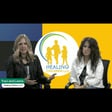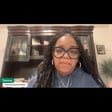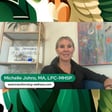Become a Creator today!Start creating today - Share your story with the world!
Start for free
00:00:00
00:00:01

Season Two/Episode One: Embracing Diversity and Raising Color-Conscious Children in a Biased World
As we approach the election and witness increased public recognition and scrutiny of people of color, especially women, it's more important than ever to address these issues head-on.
In this episode, we explore the early development of racial awareness in children and discuss effective strategies for nurturing an inclusive mindset. Mijha Godfrey, founder of Jambo Books, shares her expertise on:
- The impact of racism, discrimination, and bias on child development
- Best practices for discussing racism and bias with kids
- How parents can lead by example in promoting diversity and inclusion
Tune in and learn how to cultivate a home environment that celebrates differences and fosters understanding across racial and ethnic lines.
Transcript
Introduction to Guardians of Hope
00:00:06
Speaker
Welcome to the Guardians of Hope podcast where we bring together parents, nonprofits, legal and medical experts dedicated to positively impacting children's lives. I'm your host, Cynthia Ramserin. The purpose of this podcast is to inform and unite. Please seek advice from your attorney or doctor to address your specific needs.
00:00:29
Speaker
The thoughts and opinions of my guests are not necessarily my own, so thank you all for joining and sharing.
Why celebrate diversity in season two?
00:00:40
Speaker
All right, welcome to season two. While the topic of this episode never gets old, it is timely as we head closer to the election. Being a person of color, particularly a woman of color, is being celebrated publicly more than ever. So I wanted to take some time to focus on skin color and racial bias, ah especially acknowledging and celebrating diversity with our children.
When do children notice racial differences?
00:01:07
Speaker
According to UNICEF, babies notice physical differences, including skin color, from as early as six months. Studies have shown that by age five, children can show signs of racial bias, such as treating people from one racial group more favorably than the other. Ignoring or avoiding this topic isn't protecting our kids. It's actually leaving them exposed to bias that exists everywhere we live.
00:01:35
Speaker
And let's face it, bias is everywhere. People of all races and ethnicities can discriminate.
Who is Mija Godfrey and what is Jumbo Books?
00:01:43
Speaker
Joining me to discuss this is Mija Godfrey, founder of Jumbo Books. Mija, thank you so much for being here. Hi, Cynthia. Thanks so much for having me. I'm excited to be here. Thanks. So why don't we start by talking about your background and how you started Jumbo Books?
00:02:03
Speaker
ah Sure, so I am but trained as an attorney and worked in affordable housing, um both as sort of a a developer and um helping people get into affordable housing using policies. um But I sort of came out of all of that when I had my first child, I wanted to spend some time at home with her. And I have always been a big lover of books,
00:02:29
Speaker
My father-in-law gave us this great subscription to the Dr. Seuss book club. And the books, you know, were fun, but I started to get a little fed up um with the fact that every single book focused on white children.
00:02:46
Speaker
And I wanted my kids to see that they could be in books and should be in books that have their own experiences reflected. They should be seeing kids who don't want to brush their teeth, who love dragons, who love their grandparents and want a pet dog, who look like them.
00:03:07
Speaker
because their childhood is normal and their lives are
Why do children's books need diversity?
00:03:12
Speaker
normal. But if it's not reflected in the media that you're taking in, you can start to think, well, maybe something's wrong with me because the stories that we choose to tell tell a lot about what we value. And so that means that people whose stories are not told also get an idea of what is or is not valued.
00:03:35
Speaker
Thank you for that. Can you talk ah in detail or discuss how racism, discrimination, and ah you know racial bias affect child development?
00:03:47
Speaker
Sure, I would love to.
How can exposure combat bias?
00:03:49
Speaker
So I think we should really try to unpack the terms racism a little bit um because a lot of us now in the anti-racism movement talk about racism having to have a power component, right? And you think, well, my kid is six months old or one year old, they don't have any power.
00:04:08
Speaker
And that is not what we are talking about. We're not talking about racism in the ability to be able to take something from somebody else. But we are talking about kids showing absolute strong preferences for people of their own racial group. And this makes perfect sense. There's nothing wrong with our kids, okay? Kids are preferring people who look like the folks who feed them, who cuddle with them at night, who give them their good milk, you know, in the mornings and the evenings. So it makes sense to want to prefer the people who represent for you safety.
00:04:51
Speaker
This is why one thing I try to give a tip early on in life, try to expose your kids to as many different people of different races as you possibly can and do that in a way that is equal. What I mean is if you hire help,
00:05:10
Speaker
to help with your child rearing. Lots of us do. I did. There's absolutely nothing wrong with that. But you have to ask yourself, how do I treat the people who take care of my kids? Because they're watching, right? Do I treat those people like they work for me, like they're beneath me? Or do I treat them like family? Do I treat them like um like they're one of us.
How can parents model inclusive behavior?
00:05:35
Speaker
And that makes a big difference than how kids relate to other folks. Because one thing Ibram X. Kendi says is kids catch bias, right? And we all have just been through COVID and we have kids. We get sick from them every week from something new they bring home. It's in the air.
00:05:57
Speaker
You catch it like a cold. When the kids see how we interact with other folks, that's how they think they should interact with other folks. If they see that their parents only have friends of a certain racial background, then that's who they think are the people who we are friendly with. Those are the people we invite inside of our houses. And the other folks are somewhat different.
00:06:23
Speaker
um It's important for us then as parents to go out of our ways to set a really strong example of inclusion for everyone, of appreciation for everyone, and of celebrating everyone. um When your kid is from zero to six,
00:06:42
Speaker
It's pretty easy. You can can stay within racial and cultural celebration, right? You are noticing things. You, their parents, their first teachers, you taught them their colors. So we shouldn't expect that they're all of a sudden going to forget their colors when they look at a person.
00:07:03
Speaker
Right? So I want you to say when you have a book and you're looking at the colors of the people in the book, you say, what color is that kid's skin? It's not a bad question to ask. It's not pointing out something that's bad.
00:07:21
Speaker
Most of us are not ashamed of our skin colors. We are not ashamed of our cultures. We're proud of that. And so if you ask your child, oh, is that skin brown? Oh, it's so pretty. Do we know anybody else with brown skin? And you just have a conversation from there giving your child language to talk about race, to talk about what they see, and to ask you questions keeps those lines of communications open for the conversations that you will have in the future.
00:07:56
Speaker
you know you gave such outstanding examples. And um that leads me to my next question for you, which is how do we talk about this with our kids? In your opinion, what is the best way to talk about bias? um You said innately, we're not born to hate, we catch it, which is um such a phenomenal way to perceive racism and in children, or not even racism, just bias. So how do we approach talking about it?
How can books introduce racial differences?
00:08:27
Speaker
So one thing that I always like to use is books.
00:08:32
Speaker
Because books are easy. We have books. We don't have to go and like be awkward in front of somebody we barely know. um We can just pull up a book. And gosh, I had one right next to me. um This is a book that we're doing a book club with um with some third to fifth graders here in Decatur. But you can't you can't really see. But this character, I'm showing a book cover. She is a little black girl. She's got brown skin and big, beautiful hair.
00:09:01
Speaker
um You just do that, right? When you have the zero to six year olds, you're opening the books. And for me, I read each book with my kid many times. So you don't have to hit on skin color every time you read the book. But maybe the third or fourth time you read the book, you go through and say, hey, what color is her skin?
00:09:22
Speaker
um And what's interesting, too, is you do it with everybody. Remember, we always treat white like the default. You do it with everybody's skin. What color is this? You know, we would say white kid's skin. But let your kid tell you what color it is. Maybe it's peach. Maybe it's pink. Just go with it, right? um These are for the young kids.
00:09:43
Speaker
And you talk about hair. Is it curly? Is it straight? Look at the shape of her eyes. Aren't they so pretty? Do we know anybody else who has eyes in this shape? um That is what we want to do for very young kids. And you can just stay in that mode of appreciation and celebration.
00:10:02
Speaker
As you get older, right we say seven is the age of um
How to discuss equity with older children?
00:10:07
Speaker
empathy. When kids start to grow empathy and understand sort of interactions about being fair or not, you can start talking about fairness. And it's so great talking to little kids about fairness because they get it.
00:10:21
Speaker
Little kids are like, I know what's fair. and I know what's not fair. And they want to jump in. And that's a great opportunity for parents to talk about history right and also talk about what's happening today. So if you have older kids, for instance, and you um you know live in a town, you ask yourself, ask your kids, who are the people who are running our town? right What do they look like?
00:10:48
Speaker
Who are the people that are picking up the trash? Who are the people who are teaching kids? Who are the people who are the cleaners? Who clean the hotels? Who clean the homes? And you ask this because you want to start a conversation with your kids. You don't have to have all the answers.
00:11:09
Speaker
That's what's so awesome. You're just saying, this is something we should talk about. We're talking about fairness. We're talking about equity. What do you think about this? And if you can start from the baseline that intelligence, criminality, brilliance, funny, comedy, everything is evenly distributed through the conversation.
00:11:35
Speaker
I mean, excuse me, not through the conversation, through the population, then you can say that means that our leaders should look pretty much like what the population looks like. The people who clean and cook and take care of kids and teach should look pretty much like what the population looks like. And if it doesn't, let's have a conversation about why that might be.
00:12:04
Speaker
Perfect. Thank you so much. you yeah You give us some really good examples about talking to kids about it, and they do know what's fair and what's not fair, right? um This, I have one more question for you. um You talked a little bit about this early on in the conversation, but How do we as parents lead by example? I know you mentioned it's who we invite, it's who we communicate with, socialize with, but what if some of us we have biases that we aren't even aware of?
How can parents reflect on their biases?
00:12:37
Speaker
How do we how do we become aware of that and do better?
00:12:42
Speaker
Right, well, gosh, that's that's a really big question. you know It requires some serious self-reflection, right? um And it's hard. it is It is not easy work, but it's work that we have to do. We have to think to ourselves, what does my friend group look like?
00:13:05
Speaker
And why? How can I do things differently? um As a parent, let's say you're involved with the PTA or the PTO. um Do you encourage other people to join the PTO? They don't have to be your best friend. It can just be another parent that you see. You've seen a couple of times. Invite that person to join the PTO. Maybe they've never been asked before. Maybe they've not considered it before.
00:13:32
Speaker
um And you have to sort of pay attention to your own reactions to things. Do you clutch your purse? Do you cross the street when you see somebody who you think might be dangerous? You have to ask yourself in that moment, why did I why did i clutch my purse? Why did I cross the street? Was that Was that supported by anything that actually happened, that this person did or looked at me in a way that made me afraid, know or was I just afraid based on what I've been fed over my whole life about who is dangerous and who is not dangerous? I mean, and it's the same thing if you think, you know, maybe all East Asians are supposed to be really smart, but also really quiet. um Why do I think that? Why is that in my mind?
00:14:25
Speaker
how can I break out of that? Was I surprised when someone who wasn't white spoke English so well? Why did I think that, right? And you don't have to tell anybody, but I do think it's really helpful if you have a group of friends around you. I sort of call it your golden girl squad who can support you in this work. um You've got to have somebody who's funny and likes to have fun, like Blanche. You've got to have someone who's serious, who's going to read all the books, like Dorothy. You've got to have somebody who's just going to tell you like like it is, like Sophia. And you've got to have that person who always has their hearts and rainbows in the sky like Rose. And you know you have these people around you
00:15:14
Speaker
helping you on this journey because you can't do it by yourself. We all have to get to the Promised Land together or none of us are going to get there. But we do have to start the work on ourselves. So right. And I love that Golden Girls reference. It makes perfect sense. Mija, thank you so much for
Where to find Jumbo Books?
00:15:37
Speaker
being here. ah Tell everyone where we can get your books and where we can get more information about you.
00:15:44
Speaker
Absolutely. I would encourage everyone to please pop over to our website. It's jombobooks dot.com. That's J-A-M-B-O books.com. We send our subscribers two to three books every month that feature kids of color as the stars of their own fiction stories.
00:16:03
Speaker
If you join our mailing list, you'll get information from me about how to read those books in a way that helps you to celebrate diversity in your own home using books. And I'm also available to talk to groups, organizations, schools, parents about how to do this work more and it in more detail so that we can really make a difference. Because we are raising the kids today right now who are going to determine what our future looks like. And as parents and caregivers and teachers, we have a big hand to play in that. So I just hope we use our opportunity. Absolutely. We have to keep raising awareness, Misha. Thank you. Thank you so much for having me, Cynthia.



















